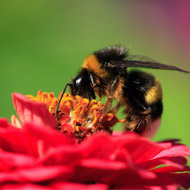Widespread decline in pollinators across Britain, study finds

Researchers said wildlife-friendly farming and gardening can have a lasting positive impact on wild pollinators.
A third of wild bee and hoverfly species have seen declines in areas of Britain where they were previously found, a new study has revealed.
Researchers said the findings act as a “warning” but there is an urgent need for more robust data on the patterns and causes of these declines. Habitat loss is thought to be a key driver.
The study, published in Nature Communications, measured the presence of 353 wild bee and hoverfly species across the country from 1980 to 2013. Findings suggest that, on average, the geographic range of these insects fell by a quarter, which equates to a net loss of 11 species per 1km square.
Overall losses were most notable for pollinator species in northern Britain, which could be down to climate change, with species that prefer cooler temperatures shrinking their range in response to less suitable landscapes.
A tenth of species were found to have increased and there was a rise in key bee species responsible for pollinating flowering crops, such as oil seed rape. Scientists say this could be a response to the large increases in mass-flowering crops grown during the study period, as well as government-funded schemes to encourage farmers to plant wildflowers.
Researchers said the findings support previous work that suggests conservation actions, including wildlife-friendly farming and gardening, can have a lasting positive impact on wild pollinators. However, these need to be refined to benefit a larger number of species.
Whilst this increase in some species is positive, lead author Dr Gary Powney said it would be “risky” to rely on this relatively small group to support long-term food security.
He added: “If anything happens to them in future, there will be fewer other species to ‘step up’ and fulfil the essential role of crop pollination”.



 The latest
The latest